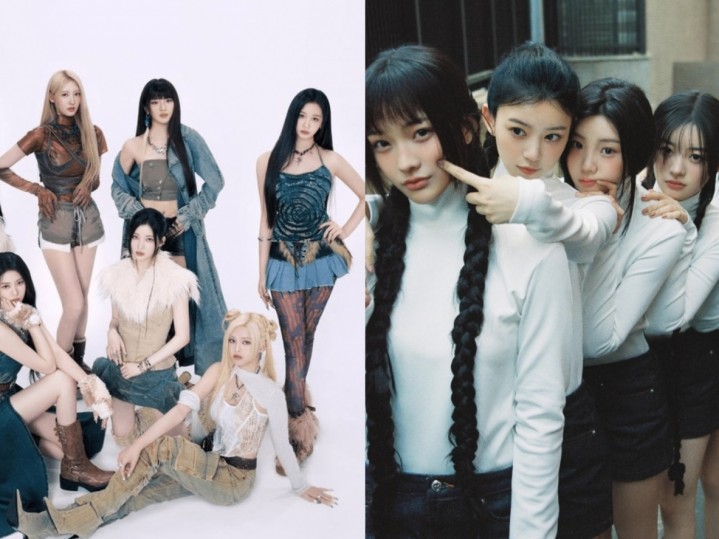Does Gender Limit K-Pop Girl Groups' Longevity? [Op-Ed]
With the long awaited comeback of iconic K-Pop idol group g.o.d, it's worth looking at what exactly makes a successful idol group. And one key factor is, apparently, gender.
There is an abundance of idol groups nowadays, and many groups won't stand the test of time. So what exactly is it that enables one idol group to keep going? Whether it be continuous promotional cycles, or something like Shinhwa and g.o.d, who have gone on hiatus before making a comeback, some groups have it, while others don't. "It" may be something One common factor is that these idol groups are boy bands rather than girl groups.
The first thing, and this seems to be a little bit sexist, is being a male idol group. Girl groups tend to have more scandals and catty behavior that leads to groups breaking up. While some 1990's idol groups have reunited formally, the most popular girl groups of the day like Fin.K.L and S.E.S have only reunited for short events.
What's one of the possible reasons behind this? The most obvious one is the dedicated fan base. K-Pop fans are devoted to their idols, and in Korea it is almost considered shameful to be a fan of multiple groups. Idols owe their success to fans, so groups with fervent support year after year, even after a group has disbanded, are likely to make a comeback.
Since the majority of K-Pop fans are females, it makes sense that male groups are more inclined to comeback time and time again; the fans are always supporting them. At just about any K-Pop concert, there is a majority of females in the crowd.
In comparison, girl groups struggle to maintain proper fan bases. Female fans may be loyal, but will generally also have a favorite boy band, leading to split attention, while male fans tend to be less loyal and switch between groups based on their concepts.
There is also more of a saturation of girl groups with similar concepts, making it harder for fans to distinguish between newer groups. Girl groups from smaller companies have to gain attention in unique ways, such as Crayon Pop's ridiculous "Bar Bar Bar" concept, but then struggle to maintain their identity.
Female idol groups also often lose much of their appeal as they get older, since most idol groups focus on sexy and cute concepts and the majority of fans don't really want to see mothers dancing in high heels and sexy outfits.
Male idol groups often are also indistinguishable because of the amount of idol groups in the industry, but, again, since the majority of K-Pop fans favor boy bands, male idol groups tend to have larger, more loyal fan bases.
Two exceptions nowadays are 2NE1 and Girls' Generation, which have embedded themselves into K-Pop in unique ways-2NE1 represents a powerful, girl-power image that attracts many female fans, and Girls' Generation has become an ideal female, who is both sexy, cute, mature, and sweet all at once.
These two groups are two of the most popular, oldest girl groups in K-Pop; Girls' Generation debuted in 2007, while 2NE1 debuted in 2009. Girls' Generation originally competed with KARA and The Wonder Girls, but both of those groups have seen line-up changes, and the Wonder Girls are no longer active. 4Minute debuted around the same time as 2NE1 and is very popular, but its popularity cannot compete with 2NE1 and Girls' Generation, and the group's longevity seems to rely almost solely on one member's popularity.
As Girls' Generation matures, the members are branching out to different aspects of the entertainment industry. 2NE1 is at the high point of its career, but fans have been complaining that CL is being promoted more than other members-competition between members have led other idol groups to disband.
In comparison to popular male idol groups, like Big Bang, Super Junior, and TVXQ, who have seen scandal after scandal and still remained standing, the girl groups seem more likely to disband within the next few years.
But Big Bang has been involved in drug and homicide scandals and returned to the top, while Super Junior's become the first idol group to incorporate a rotating system where members leave to the army as other ones return from it. TVXQ is the oldest idol group from the second generation of idols, but has seen a split- but the original TVXQ members who left and formed JYJ are also incredibly popular worldwide among fans.
Why were these groups able to overcome breaking up during times of hardship? It could be their contracts with their companies, but it seems to be primarily the support of fans. Idol groups will dedicate songs to their fans, and fans will request reunions and comebacks even after a group has broken up, or been involved in a scandal.
Loyalty plays a big role, and it honestly seems that female idol groups in general don't evoke as much loyalty from fans as male groups do.
Will there never be a girl group that lasts ten years, or reunites in their thirties or forties? Probably not. Girls' Generation and 2NE1 are good candidates for long-lasting careers, but, based on the long-lasting groups in the industry and the idol groups that have reunited, it seems easier for male groups to make a comeback later in life.
















